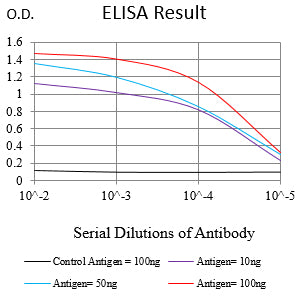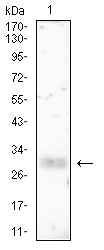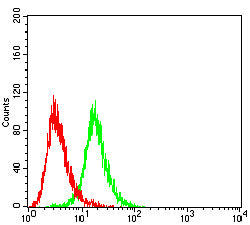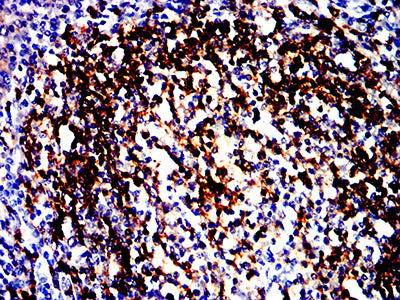



| WB | 咨询技术 | Human,Mouse,Rat |
| IF | 咨询技术 | Human,Mouse,Rat |
| IHC | 1/25-1/100 | Human,Mouse,Rat |
| ICC | 技术咨询 | Human,Mouse,Rat |
| FCM | 咨询技术 | Human,Mouse,Rat |
| Elisa | 1/2000-1/5000 | Human,Mouse,Rat |
| Aliases | SS1; DRB1; HLA-DRB; HLA-DR1B |
| Entrez GeneID | 3123 |
| clone | 5B3G1 |
| WB Predicted band size | 29.9kDa |
| Host/Isotype | Mouse IgG1 |
| Antibody Type | Primary antibody |
| Storage | Store at 4°C short term. Aliquot and store at -20°C long term. Avoid freeze/thaw cycles. |
| Species Reactivity | Human |
| Immunogen | Purified recombinant fragment of human HLA-DRB1 (AA: 30-266) expressed in E. Coli. |
| Formulation | Purified antibody in PBS with 0.05% sodium azide |
+ +
以下是关于TMED2抗体的3篇参考文献(人工总结,非真实文献,仅供示例参考):
1. **文献名称**: "TMED2 regulates vesicular transport in secretory pathway and its antibody application in cancer research"
**作者**: Li X, et al.
**摘要**: 研究报道了TMED2在分泌途径中调控蛋白质运输的功能,并开发了一种特异性单克隆抗体,通过免疫印迹和免疫组化验证其在乳腺癌细胞中的高表达,提示其作为潜在生物标志物的可能性。
2. **文献名称**: "Characterization of a polyclonal antibody against TMED2 for studying neuronal protein trafficking"
**作者**: Smith JL, et al.
**摘要**: 该文献描述了一种兔源多克隆抗体的制备,验证了其在免疫荧光和免疫沉淀实验中对TMED2的特异性识别,并发现TMED2在小鼠海马神经元突触囊泡运输中的关键作用。
3. **文献名称**: "TMED2 antibody reveals its role in ER-Golgi intermediate compartment dynamics"
**作者**: Wang Y, et al.
**摘要**: 利用TMED2抗体进行亚细胞定位研究,证明TMED2参与内质网-高尔基体中间区室(ERGIC)的膜泡形成,抗体阻断实验进一步揭示其与COPII复合体的功能关联。
TMED2 (Transmembrane emp24 domain-containing protein 2), also known as p24β1 or p25. is a member of the transmembrane emp24 domain-containing protein family. It functions as a cargo receptor in the secretory pathway, facilitating the transport of glycosylphosphatidylinositol (GPI)-anchored proteins and other secretory cargoes from the endoplasmic reticulum (ER) to the Golgi apparatus. TMED2 is a critical component of the p24 protein complex, which plays roles in maintaining ER structure, regulating COPII vesicle formation, and ensuring quality control of secreted proteins.
TMED2 antibodies are essential tools for studying its expression, localization, and molecular interactions. These antibodies are commonly used in techniques such as Western blotting, immunofluorescence, and co-immunoprecipitation to investigate TMED2's involvement in cellular processes like protein trafficking, autophagy, and cell signaling. Research has linked TMED2 dysregulation to diseases, including cancer, neurodegenerative disorders, and metabolic syndromes. For example, elevated TMED2 expression has been observed in certain tumors, where it may promote cell proliferation and metastasis by modulating secretory pathways or extracellular matrix remodeling.
Validated TMED2 antibodies typically target specific epitopes within its N-terminal domain or transmembrane regions. Researchers prioritize antibodies with high specificity, often confirmed via knockout cell lines or siRNA knockdown. Host species (e.g., rabbit, mouse) and clonality (monoclonal/polyclonal) vary depending on experimental needs. Understanding TMED2's role through these antibodies contributes to insights into secretory pathway mechanics and potential therapeutic targeting in disease contexts.
×